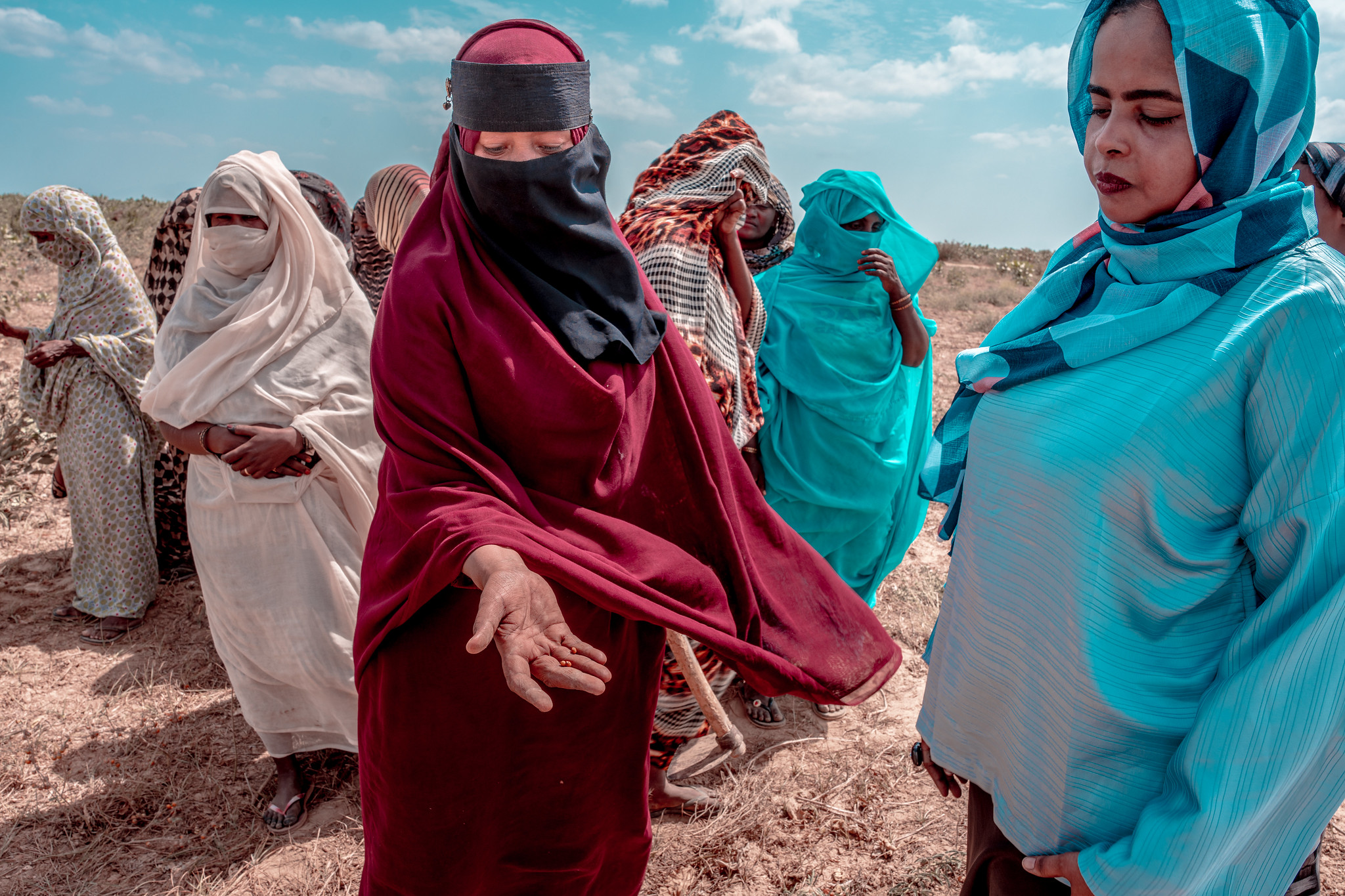UN photo of Amna Idres Musa Mahamod, leader of the Al-Wifag Women’s Association in Toker, Sudan, April 6, 2025, by Mona Elfateh, via UN Women.
Sudan: Humanitarian Crisis and Foreign Aid Cuts
As new frontlines in the Sudanese civil war worsen the humanitarian crisis, U.S. and U.N. agencies cuts international humanitarian funding. Maryknoll Office for Global Concerns Program Associate Fellow Mark Joyce reports.
The humanitarian crisis in Sudan stemming from the war between the Rapid Support Forces (RSF) militia and the Sudanese Army reaches new depths as two major hotspots emerge in the oil-rich Kordofan region and the strategic Sudan-Libya-Egypt border triangle in North Darfur.
The Kordofan region produces oil for Sudan, bringing in revenue for Sudan and its neighbor South Sudan. Defeating the RSF in Kordofan would allow the Sudanese Army to advance into Darfur, the RSF’s heartland. An RSF victory would threaten oil production and give the RSF a victory on the heels of their defeat in Khartoum by the Sudanese Army.
In North Darfur, the RSF recently captured the Sudan-Libya-Egypt border region, which opens up new opportunities for them to advance on the Nile Valley and resupply through Libya. Having access to supply lines through Libya is critically important to the RSF due to heightened international scrutiny and pressure on Chad that have made the corridor from Chad to Darfur less viable. There are reports of increased air traffic into the south-eastern Libyan district of Kufra, allegedly from the UAE, signaling that supply lines have shifted.
Both sides of the conflict have been credibly accused of targeting civilians. Last month, the Sudanese Army was accused of using strikes in El-Fula and the town of Abu Zabad as a form of “collective punishment.” The United Nations reports that the strikes on El-Fula and Abu Zabad killed more than 20 people. The RSF, in North Kordofan’s Bara area and the villages of Shag Alnom and Hilat Hamid, in accused of killing 450 civilians — including 24 boys, 11 girls, and two pregnant women.
The United Arab Emirates exerts significant influence over the RSF. Gold is a major factor in funding both sides of the conflict, and the UAE is one of the main hubs for gold trade globally. A recent report by the UN panel of experts on Sudan suggests that around ten tons of gold, with a value of $860 million, were extracted from RSF-controlled areas in 2024.
The ever-changing frontlines of the conflict have exacerbated insecurity and displacement among civilians. The UN Office for the Coordination of Humanitarian Affairs (OCHA) recently reported that the UN had devised new plans to address the needs of 380,000 displaced people in the locality of Tawila, in North Darfur. The plan aims to increase life-saving assistance over the next three months, with a focus on food, healthcare, water, sanitation, shelter, and protection. The plan requires an estimated $120 million for implementation.
This funding priority comes as OCHA faces a dire financial environment. Their 2025 funding request for $44 billion to help “180 million people, including refugees,” was recently revised to $29 billion after the United States cut its foreign assistance. Midway through the year, they have received only $5.6 billion — less than 20 percent of their reduced ask. “We have been forced into a triage of human survival,” said Under-Secretary-General for Humanitarian Affairs and Emergency Relief, Tom Fletcher. In April, OCHA was forced to cut staff by 20 percent due to a $58 million budget shortfall. The $63 million the United States once contributed annually would have accounted for 20 percent of OCHA’s extrabudgetary resources in 2025.
Chad, one of the world’s poorest countries, has received 1.2 million Sudanese refugees since the beginning of the war. The border town Adre, which had a prewar population of 40,000, has seen an influx of 235,000 Sudanese refugees. The UN World Food Program (WFP) reported in June that it could not guarantee funding to support Sudanese refugees in Adre past July. The United States’ cuts to aid have forced the WFP to lay off 30 percent of its workforce and slash 30 percent of its funding for eastern Chad. In 2024, the United States contributed $39.3 million to the emergency response in Chad. So far this year, it has contributed only $6.8 million.
In an installment of Pax Christi International’s “Sudan Speaks” webinar series, three researchers with experience in Sudan and neighboring countries spoke about the plight of Sudanese women who make up the majority of the displaced population and face disproportionate gender-based violence and food insecurity. Despite this hardship, all three speakers described the strength and resilience they have seen in Sudanese women.
Ferdous Abdalhameed, a community leader and advocate who was displaced from Darfur, said, “Keep talking about Sudan, keep talking about what is happening there. Don’t be silent, the least we can do is to talk about it. Whoever you meet, just tell them people are suffering there, people are dying there systematically and consciously. Women and children are suffering there, and they are hidden. No one can see them or feel them.”

